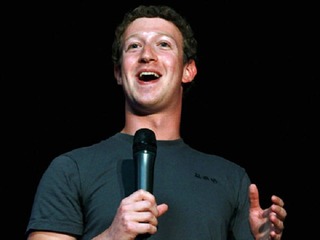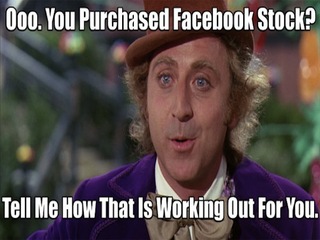
Following the release of Facebook’s third-quarter results, which sent shares up in after-hours trading, Mark Zuckerberg got on a conference call to talk about Facebook’s vision and strategy going forward.
Clearly, the market was applauding. Shares gained even more ground, rising 13% to $22.03.
“Our mission is to make the world more open and connected. We do this by giving people the power to share whatever they want and be connected to whoever they want, no matter where they are,” Zuckerberg said and he outlined three pillars of this strategy:
1. To build the best and most ubiquitous mobile product
2. To build a platform where every new app that is created can be social and enable people to share.
3. To build strong monetization and economic engine that will build Facebook into one of the world’s most valuable companies.
Mobile:
Zuckerberg called mobile, “the most misunderstood aspect of Facebook today” and said that people underestimate how good the trend toward mobile can be for the social network.
There are three reasons for this: mobile allows Facebook to reach more people than desktop, people on mobile use Facebook more often, and in the long-term Facebook will be able to monetize better for the amount spent on mobile than on desktop.
“All of these combined together make mobile a much bigger opportunity than most people realize,” said Zuckerberg.
Facebook will be able to reach more people on mobile than desktop because, in coming years, there will be billions more smartphones than desktop computers. Facebook is already reaching one billion people worldwide, and over 600 million mobile, up from 376 million the year before.
Facebook is also the most widely downloaded app on every smartphone platform, he said, so it is well positioned to reached growing smartphone population.
People are only 40% likely to use Facebook on a desktop computer, but 70% more likely to use FB on mobile during a given day,
Facebook was able to increase mobile engagement by updating its iOS app in September and, since the update, Facebook has seen an 80% increase in iOS loading speed, and over 20% increase in iOS engagement in terms of likes and comments.
So now that people are more engaged and are spending more time using FB on mobile, how much money can be made from that time?
“I believe that over the long-run we’re going to see more monetization for time spent on mobile than on desktop,” he said.
While he admits that this is not proven yet, Facebook is committed to getting there, and Zuckerberg believes this because on mobile monetization has to be imbedded deeply into product, reiterating some of the points he made during his speech at TC Distrupt last month.
Facebook built a multi-billion dollar business on desktop with ads on the side, separated from people’s primary experience.
On mobile, ads have to act more like TV: they have to be high quality, and integrated into the experience.
Since monetization needs to be integrated directly, it allows each product group to own the monetization experience for their product, Zuckerberg said, and they are already unlocking a lot of ideas and creativity. Facebook is starting to see higher quality monetization experiences in terms of better ad products for people and better results for advertisers.
Zuckerberg called it a “myth” that Facebook cant make money on mobile. They simply had not started trying yet. and today, after just six months since ramping up mobile ad revenue, the social network is already seeing 14% of its ad revenue, or $150 million, coming from mobile.
Platform:
The last five to 10 years were about getting everyone connected and mapping out relationships between people. Now that everyone is connected, the next five to 10 years will be about creating app experiences that are now possible to be built because of the already mapped out relationships.
Social graph is new critical infrastructure for companies, Zuckerberg noted, since a majority of people who use their services are on Facebook. As a result, developers are increasingly building social apps and, today, 8 of the top 10 iOS apps, and 40% of top 400, integrate with FB.
Zuckerberg believes that social apps will best product in every business category, but as apps get built, and industries transform because of it, he is frequently asked how is this good for Facebook.
Over time, he says, the more value Facebook provides, the more revenue it will be positioned to get back., either through developers buying ads, running FB ads through their network, using their payments service, or other possible ways.
“We’re committed to building a sustainable and profitable platform.”
While discussing the platform, Zuckerberg went off on two tangents about games and Instagram.
He said that gaming on Facebook is also misunderstood
“Overall, gaming on Facebook isn’t doing as well as I’d like”, he said, but there are two different stories to be told.
While payments revenue from Zynga decreased by 20% this quarter, compared to last year, the rest of games ecosystem has actually been growing, increasing 40% over last year, something Zuckerberg sees as “pretty encouraging.”
Instagram, on the other hand, Zuckerberg calls “a platform success story.”
He says that Facebook bought instagram after it built a social integration that a lot of people really liked. And both companies saw opportunity to do even more together.
Instagram had 27 million registered users, now 100 million. And, now more mobile time spent on instagram than on Twitter.
Instagram, he says, can now grow even faster with Facebook tools at its disposal.
Monetization
There are a few monetization products Zuckerberg is excited about, and he believes will increase monetization in the long term:
- Mobile App Installs – which Facebook uses to provide distribution to increase discovery for app, so that developer can get more people to use it.
- Facebook Exchange and Custom Audiences – which can improve targeting capabilities so ads are relevant and interesting to ppl on FB. Create better experiences.
- Gift launch – though its in its early days, Zuckerberg sees an opportunity to bring more commerce to FB over time, and gifts is the logical first step. Millions of birthday message are already sent every day, he said, and people asked to do more. Gifts provides an ppportunity to learn about how people buy things and will help Facebook build better services in future.
Facebook’s third-quarter numbers
Before the call, and after the close, Facebook posted revenue of $1.262 billion for the quarter, higher than Wall Street’s estimates of $1.23 billion. Adjusted earnings per share came in at 12 cents in the third quarter, compared with the 11 cents a share that analysts were expecting.
The social network saw its monthly active users increase by 26% year to year to 1.01 billion, and saw its daily active users increase 28% from the previous year to 584 million.
Mobile MAUs were 604 million as of the end of September, an increase of 61% year-to-year.
“As proud as I am that a billion people use Facebook each month, I’m also really happy that over 600 million people now share and connect on Facebook every month using mobile devices,” said Mark Zuckerberg, Facebook founder and CEO said in a statement. “People who use our mobile products are more engaged, and we believe we can increase engagement even further as we continue to introduce new products and improve our platform. At the same time, we are deeply integrating monetization into our product teams in order to build a stronger, more valuable company.”
Revenue
Facebook’s revenue was up 32% year to year, from $954 million to $1.26 billion. If not for foreign exchange rates, Facebook notes, the increase would have been 38%.
Advertising revenue was $1.09 billion, or 86% of total revenue. It increased 36% from the same quarter in 2011. Once again, if not for foreign exchange rates, it would have been an increase of 43%.
Revenue from payments and fees took in $176 million. While this represents a 13% increase year-to-year, it also was a 9% decrease quarter to quarter.
Net income
GAAP income before provision for income taxes was $372 million, but after the provision, Facebook saw a net loss of $59 million, compared to net income of $227 million for the third quarter of 2011.
Non-GAAP net income was $311 million or $0.12 per share, compared to $273 million and $0.12 per share for the same quarter in the prior year.
(Image source: http://www.cnn.com)




















